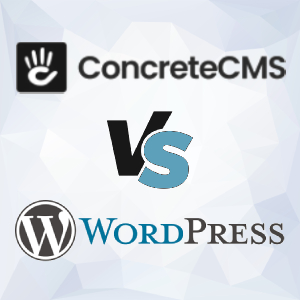ConcreteCMS vs WordPress: Which One Should You Choose?
When choosing a platform for building websites, ConcreteCMS and WordPress are two leading options. ConcreteCMS excels with its intuitive in-page editing, robust security, and built-in caching, making it an excellent choice for developers prioritising performance and reliability. While WordPress offers extensive customisation through a vast plugin ecosystem, it requires more maintenance to ensure security and performance.
| Platform | Concrete | WordPress |
| Ease of Use | Concrete offers an intuitive in-page editing experience, allowing users to easily manage content directly on the site without navigating complex menus. |
While WordPress is user-friendly, especially with the Gutenberg block editor, it can be more challenging for beginners due to its extensive features and options.
|
| Customisation | Concrete provides flexibility with a strong block-based system that allows developers to create custom blocks tailored to specific needs. | WordPress offers a vast array of plugins and themes for customisation, but integrating custom solutions can require more technical expertise. |
| Cost | ConcreteCMS is open-source, and most features are available out-of-the-box, potentially reducing reliance on paid extensions. | While WordPress itself is free, many premium plugins and themes can add to the overall cost of building a feature-rich site. |
| Scalability | Concrete is well-suited for small to large-scale projects, offering robust built-in features without requiring excessive plugins. | WordPress can scale effectively with the right hosting and optimisations, though it may require more plugins and tweaks for large projects. |
| Themes and Templates | Concrete offers a smaller selection of themes compared to WordPress but allows for significant customisation of templates. | WordPress boasts a vast library of themes, providing a wide range of design choices but potentially requiring more time to find the perfect fit. |
| App Ecosystem | The app ecosystem is smaller but focused, with core features integrated seamlessly, minimizing the need for additional apps. | WordPress has a vast ecosystem with thousands of plugins, providing almost limitless options but sometimes leading to compatibility issues. |
| Performance | ConcreteCMS has a built-in page cache that enhances page load speed on the front end, with plugins designed to work seamlessly with the caching system. | WordPress lacks a built-in caching system, requiring users to install caching plugins that may incur additional costs, and some plugins may not be compatible with all caching solutions, leading to potential conflicts. |
| SEO Features | Concrete offers built-in SEO tools that are easy to use, allowing for efficient optimisation of web pages.. | WordPress has comprehensive SEO capabilities, often enhanced by plugins like Yoast SEO. |
| Community Support | Concrete has a dedicated but smaller community, providing focused support and resources for its users. | WordPress benefits from a large, active community with extensive resources, forums, and third-party support options. |
| Security | Concrete is known for its strong security measures and has very few reported hacking incidents, making it a reliable choice for secure sites. | WordPress sites are often targeted due to their popularity, and without regular updates and proper security practices, they are much more vulnerable to hacks. |
| Hosting | ConcreteCMS can be hosted on most web servers, but may require more specific server configurations for optimal performance. | WordPress is widely supported by hosting providers, with many offering optimised plans specifically designed for WordPress sites. |
In conclusion, while both ConcreteCMS and WordPress offer valuable features, Concrete CMS emerges as the stronger choice for developers who prioritise ease of use, security, and performance. Its intuitive in-page editing, built-in caching, and robust security measures make it a reliable, low-maintenance solution that can meet the demands of any project. While WordPress offers extensive customisation, it often comes with increased maintenance and security concerns. For those seeking a powerful, secure, and efficient platform, ConcreteCMS is the clear winner.
blog comments powered by Disqus


















